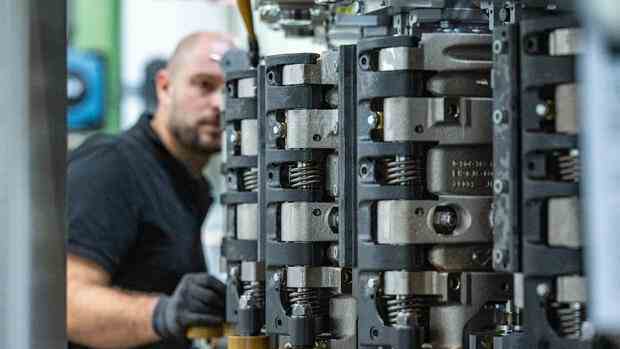According to the latest survey by the VDMA, 74 percent of companies see their business activities as being seriously or noticeably affected by delivery bottlenecks.
(Photo: dpa)
Frankfurt German machine and plant manufacturers were able to hold their ground in 2022 despite various problems. “We are confident that we will achieve our goal of real production growth of one percent this year and are sticking to our forecast for the coming year,” said Karl Haeusgen, President of the Association of German Machine and Plant Manufacturers (VDMA), on Tuesday the annual press conference in Frankfurt.
A year ago, i.e. before the start of the Russia-Ukraine war, the industry had originally targeted a production increase of seven percent in real terms for 2022. However, machine production is being hampered by supply chain difficulties and material shortages. “High inflation and the Ukraine war with all its consequences will continue to burden our industry for a long time to come. Material shortages and difficulties in the supply chain persist, and more and more countries are returning to protectionist measures.”
According to the latest flash survey by the VDMA from the beginning of December, in which more than 600 member companies took part, 74 percent of the companies see their business activities as being seriously or noticeably impaired by such bottlenecks. The association is expecting a two percent drop in production for 2023 – but this is far from the setbacks of previous years – and from a crisis, according to Haeusgen.
>> Also read: Secret project list: This is the traffic light plan against China’s global influence
Top jobs of the day
Find the best jobs now and
be notified by email.
Against the background of ongoing trade tensions between Europe and China, the VDMA has developed a comprehensive China position for the first time. Because the aggressive economic policy of the Chinese government is creating new difficulties, especially for medium-sized industry. “Change through trade no longer works with the current government,” says Haeusgen. However, this was not foreseeable at the beginning of the reign of XI Jinping.
Competitor China “wide awake”
However, the Chinese market cannot be replaced in the short or medium term. For this reason, instruments to promote exports to China should not be abolished, said Haeusgen. It can still be possible to keep China in the economic community of the world. With a share of 13.4 percent, the People’s Republic is Germany’s most important foreign machine supplier. “The competitor is wide awake,” warned Haeusgen.
It is therefore right that the federal government is reassessing the relationship with China. In addition, the VDMA recommends that the EU should finally implement the Mercosur agreement and conclude further free trade agreements with partner countries in Asia. India is mentioned as an example in the China position. “It is important to protect the EU internal market from unfair trade practices from third countries, especially from China. However, there must always be a balance between offensive and defensive trading instruments. According to Haeusgen, there should never be a “Fortress Europe” again.
skills shortage
97
percent
of the machine builders surveyed by the VDMA feel staffing bottlenecks.
The new US anti-inflation package has so far had little effect on domestic mechanical engineering, said Haeusgen. Because the US tax credits would only be available for projects in the field of renewable energies. Nevertheless, the current tensions between the EU and the USA are worrying machine builders. There is an intensive debate on the question of “whether Europe is threatened with a significant relocation of industrial value creation and jobs to the USA,” explained the VDMA President. Because in certain areas such as wind energy or hydrogen, investors could prefer American projects to European ones.
Skills shortage is slowing down
According to the VDMA survey, almost half of the 600 companies surveyed were optimistic or cautiously optimistic about the new year. However, according to Haeusgen, expectations are dampened by the fact that around ten percent of the workforce in the industry will retire in the near future.
Because in addition to supply chain problems, the lack of skilled workers in particular is slowing down production: According to the VDMA, around 14,000 jobs in mechanical engineering are currently vacant. The general shortage of skilled workers also means that almost all of the companies surveyed (97 percent) experience bottlenecks when it comes to staffing.
More: Shortage of skilled workers and energy crisis: medium-sized companies are showing increasing interest in robotic solutions
